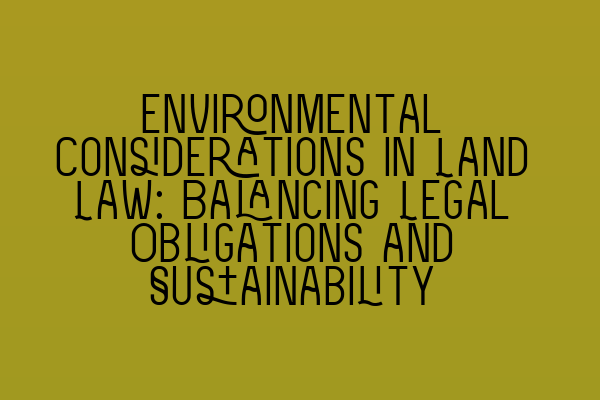Environmental Considerations in Land Law: Balancing Legal Obligations and Sustainability
Gone are the days when property transactions were solely concerned with legal obligations and financial gains. In today’s world, environmental considerations have become a crucial aspect of land law. As society becomes more conscious of the impact on the environment, it is imperative for solicitors and legal professionals to navigate the complex landscape of balancing legal obligations with sustainability.
The Scope of Environmental Considerations in Land Law
Environmental considerations in land law encompass a wide range of issues, including but not limited to:
- Environmental Impact Assessments (EIAs)
- Habitat preservation
- Waste management
- Energy efficiency
- Climate change mitigation
- Water resource management
These considerations aim to minimize the harmful effects of human activities on the environment, promote sustainable development, and ensure the long-term well-being of future generations.
Legal Obligations
Legislation governs the environmental obligations associated with land law transactions. Various statutes and regulations, both at national and international levels, address specific aspects of environmental protection. For example, in the UK, the Environmental Impact Assessment Regulations 2017 require developers to assess and consider the potential environmental effects of their projects.
Furthermore, there are legal frameworks in place to protect and preserve ecologically important areas, such as national parks and designated wildlife habitats. Solicitors and legal professionals must be well-versed in these laws to ensure compliance and mitigate any legal risks for their clients.
Sustainability and Land Law
While legal obligations provide a framework for environmental protection, sustainability goes beyond mere compliance. Sustainable land law practices aim to strike a balance between development and environmental stewardship, ensuring that the use of land is optimized for present needs without compromising the ability of future generations to meet their own needs.
For example, sustainable land development may involve incorporating green infrastructure, utilizing renewable energy sources, and implementing water conservation strategies. By adopting sustainable practices, landowners and developers can reduce their environmental footprint and demonstrate their commitment to long-term environmental well-being.
The Role of Solicitors and Legal Professionals
Solicitors and legal professionals play a pivotal role in facilitating environmentally sustainable land transactions. They assist clients in identifying and navigating the legal obligations associated with land law and provide guidance on incorporating sustainable practices into their projects.
It is essential for solicitors to stay updated with the evolving environmental regulations and best practices. This knowledge allows them to provide accurate advice and ensure that their clients are well-informed about the potential environmental implications of their land transactions.
Additionally, solicitors can help clients access relevant environmental assessments and reports, such as Environmental Impact Assessments and Habitat Surveys, to assess the potential environmental risks and guide decision-making processes within the bounds of the law.
Conclusion
As environmental concerns take center stage in society, solicitors and legal professionals must integrate environmental considerations into their land law practices. The balancing act between legal obligations and sustainability requires a comprehensive understanding of the legal frameworks, environmental regulations, and best practices.
At SQE Property Law & Land Law, our team of dedicated solicitors and legal professionals is well-equipped to navigate the complex landscape of environmental considerations in land law. We ensure that our clients meet their legal obligations and adopt sustainable practices for a greener and more sustainable future.
If you have any questions or require legal assistance, please do not hesitate to contact us.
Related Articles:
